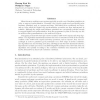Free Online Productivity Tools
i2Speak
i2Symbol
i2OCR
iTex2Img
iWeb2Print
iWeb2Shot
i2Type
iPdf2Split
iPdf2Merge
i2Bopomofo
i2Arabic
i2Style
i2Image
i2PDF
iLatex2Rtf
Sci2ools
116
click to vote
IEEEPACT
2003
IEEE
2003
IEEE
Reactive Multi-Word Synchronization for Multiprocessors
Shared memory multiprocessor systems typically provide a set of hardware primitives in order to support synchronization. Generally, they provide single-word read-modify-write hardware primitives such as compare-and-swap, load-linked/store-conditional and fetchand-op, from which the higher-level synchronization operations are then implemented in software. Although the single-word hardware primitives are conceptually powerful enough to support higher-level synchronization, from the programmer’s point of view they are not as useful as their generalizations to the multi-word objects. This paper presents two fast and reactive lock-free multi-word compare-and-swap algorithms. The algorithms dynamically measure the level of contention as well as the memory conflicts of the multi-word compare-and-swap operations, and in response, they react accordingly in order to guarantee good performance in a wide range of system conditions. The algorithms are non-blocking (lock-free), allowing in this ...
Hardware | Hardware Primitives | IEEEPACT 2003 | Multi-word Compare-and-swap Algorithms | Single-word Hardware Primitives |
| Added | 04 Jul 2010 |
| Updated | 04 Jul 2010 |
| Type | Conference |
| Year | 2003 |
| Where | IEEEPACT |
| Authors | Phuong Hoai Ha, Philippas Tsigas |
Comments (0)

